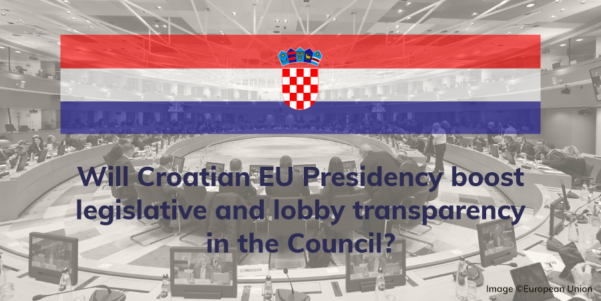Brussels, 12 December 2019– Access Info today joined the organisation GONG (Croatia) and 33 other NGOs from across Europe in calling on the incoming Croatian Presidency of the European Union to act to ensure legislative and lobby transparency, and in particular to ensure transparency of the Council of the EU.
The organisations note that at least half of all laws passing through national parliaments are related to norms and directives adopted at the EU level, and yet without transparency of the Council, it is almost impossible for citizens at the national level to engage in debate at the root source of these laws in the EU institutions.
The letter makes specific reference to the 2018 inquiry of the European Ombudsman which severely criticised the lack of transparency of the Council. Key pieces of jurisprudence which have highlighted this include the case of Access Info Europe vs. Council of the EU (17 October 2013), which has had some positive impact but has still not resulted in sufficient transparency of the Council’s over 150 preparatory bodies, which still do not keep or publish detailed minutes of their discussions.
Access Info’s research has identified a series of obstacles, which we presented to the European Ombudsman in 2018 as part of her enquiry into Council transparency.
- Lack of proactive publication: Legislative documents are not systematically available proactively in the Council register, therefore citizens are not informed and have to request document by document
- Poor record keeping: Council working parties have diverging practices on record keeping, with some not keeping a full record of discussions
- Details not recorded: The names of Member States making proposals or taking positions are not recorded
- Published documents are hard to find: The public register is not user friendly, and you need to know the terminology, for example, “outcome of proceedings” instead of “minutes of meetings”
- Automatic classification: Many documents are automatically classified for limited circulation, “LIMITÉ” particularly key documents such as legal advice.
“Without transparency of the Council, we will continue to have the problem of national governments laundering their policies through Brussels and then blaming the EU for the policies”, explained Helen Darbishire, Executive Director of Access Info. “This in turn damages the EU decision-making process, undermining faith in the common European democratic project. This is a massive risk and the only solution is greater transparency.”
The letter from the 35 organisations notes that the Finnish Government, along with nine other EU governments, has supported a non-paper demanding higher legislative transparency at the Council. It is of deep regret that the Croatian Government and 17 other member state governments have not yet joined them.
Access Info also notes that parliamentarians from across Europe, as part of the COSAC group (the Conference of the Committees of the National Parliaments of the EU Member States dealing with the European Union affairs) has also expressed concern at the difficulty they have in obtaining information from the Council and has called for greater openness.
“At this critical time for European democracy, in the face of a rise of populism and the urgent challenge of climate change, it’s imperative that the Council is fully open and permits genuine citizen participation,” concluded Darbishire.
Access the Open Letter to the Croatian Prime Minister Plenkovic ![]()
![]()

